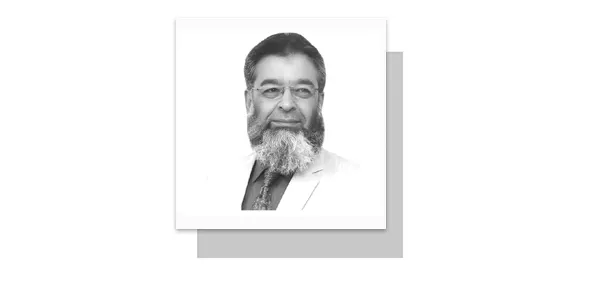THE true essence of sacrifice, as exemplified in the story of Hazrat Ibrahim (AS) and his son Hazrat Ismail (AS), lies not merely in the physical act of slaughtering an animal but in the profound spiritual submission, moral courage, and unwavering obedience to the will of Allah.
It is the conversation between a father and his son that encapsulates the real philosophy of sacrifice.
The Qur’an beautifully records this sacred dialogue in Surah As-Saffat: “And when he (Ismail) was old enough to accompany him, he (Ibrahim) said, ‘O my son, indeed I have seen in a dream that I must sacrifice you, so see what you think.’ He said,
‘O my father, do as you are commanded.
You will find me, if Allah wills, of the steadfast.’”
(Surah As-Saffat 37:102)
This extraordinary exchange is not just a tale from the past; it is a timeless parable of submission, discipline, and the triumph of faith over worldly attachments.
The sacrificial ram, later provided by Allah as redemption, became a symbol, but what we often forget is the essence — the conversation.
Hazrat Ibrahim’s (AS) willingness to let go of what he loved most and Hazrat Ismail’s (AS) submission to Allah’s command show that real sacrifice is surrendering our will to the will of the Almighty.
We remembered the ram — the physical sacrifice — but forgot the conversation — the spiritual submission it represented.
Today, as the Islamic Ummah, especially Pakistan, faces crises — political instability, economic downturns, moral decay, and a fractured society — we must revive the true philosophy of sacrifice: not mere ritual slaughter, but the inner sacrifice of egos, unlawful desires, and the lust for wealth and power.
The Quran commands: “Indeed, Allah does not change the condition of a people until they change what is in themselves.
” (Surah Ar-Ra’d 13:11) This verse resonates profoundly with our current state.
If Pakistan is to rise and reclaim its dignity and honour, it must undergo internal purification.
Our leaders must sacrifice their self-interested ambitions for the collective good.
Our citizens must relinquish dishonesty, bribery, tax evasion, and misuse of public resources.
Every individual must reflect on what they are willing to give up for the sake of the greater good.
The spirit of sacrifice should translate into ethical governance, social justice, and national solidarity.
Hazrat Ibrahim (AS) was not commanded to sacrifice his son to cause pain, but to demonstrate complete submission to divine will.
The command was a test, and the response was the highest form of spiritual maturity.
Pakistan, too, is going through trials.
We must ask ourselves — what are we willing to sacrifice to earn Allah’s pleasure and to restore our nation to the path of righteousness?
Can we sacrifice our sectarian divides for the sake of unity?
Can we give up hate speech and extremism for peace?
Can we abandon illegal gains to promote fair economic practices?
Prophet Muhammad (ﷺ) said, “There is a piece of flesh in the body, and if it is sound, the whole body is sound… that piece is the heart.
” (Sahih Bukhari & Sahih Muslim) The heart’s reformation is essential; greed, envy, and pride must be uprooted.
Our political culture needs healing from hypocrisy and self-interest; our economy from usury and exploitation; and our education must instill responsibility, truthfulness, and service.
Hazrat Ibrahim’s (AS) sacrifice was not blind — it followed divine vision, reflection, consultation, and obedience.
Likewise, Pakistan must act with vision and ethics.
National policies should be rooted in consultation, foresight, and alignment with Islamic values.
Our sacrifices must aim for a higher purpose — national revival grounded in morality.
The Quran states: “Their meat will not reach Allah, nor will their blood, but what reaches Him is piety from you” (Surah Al-Hajj 22:37).
This verse shatters the idea that sacrifice is about the animal alone — the true offering is Taqwa, God-consciousness.
Pakistan urgently needs this in all sectors.
Civil servants must act with integrity, businessmen with fairness, scholars with sincerity, and media with truth.
Youth must sacrifice ease for national progress.
The conversation between Hazrat Ibrahim (AS) and Hazrat Ismail (AS) shows intergenerational trust — a father consults, a son consents.
In today’s fractured families, we must rebuild through faith and mutual respect.
Real sacrifice is surrendering our lower selves for a higher purpose.
Our issue is not lack of talent or resources, but our unwillingness to abandon comfort, shortcuts, and selfishness for collective good.
On this Eid, as the Ummah reflects on the legacy of Hazrat Ibrahim (AS), Pakistan must lead by example.
Let us revive the spirit of that conversation — the moment of truth, faith, and resolve.
Let the ethos of sacrifice shape our homes, institutions, and society.
Let us not just remember the ram, but the willingness behind it.
May our sacrifices be internal — arrogance for humility, fraud for honesty, division for unity, despair for hope.
Only then can we hope for divine help, social harmony, and national revival.
Only then will our sacrifices carry meaning — in the sight of Allah and the story of nations.
Only then can Pakistan become what Allama Iqbal envisioned and Quaid-e-Azam strived for: a nation built not by blood alone, but by belief, sacrifice, and righteousness.
—The writer is contributing columnist, based in Islamabad. (ememiqbal68@gmail.com)


















